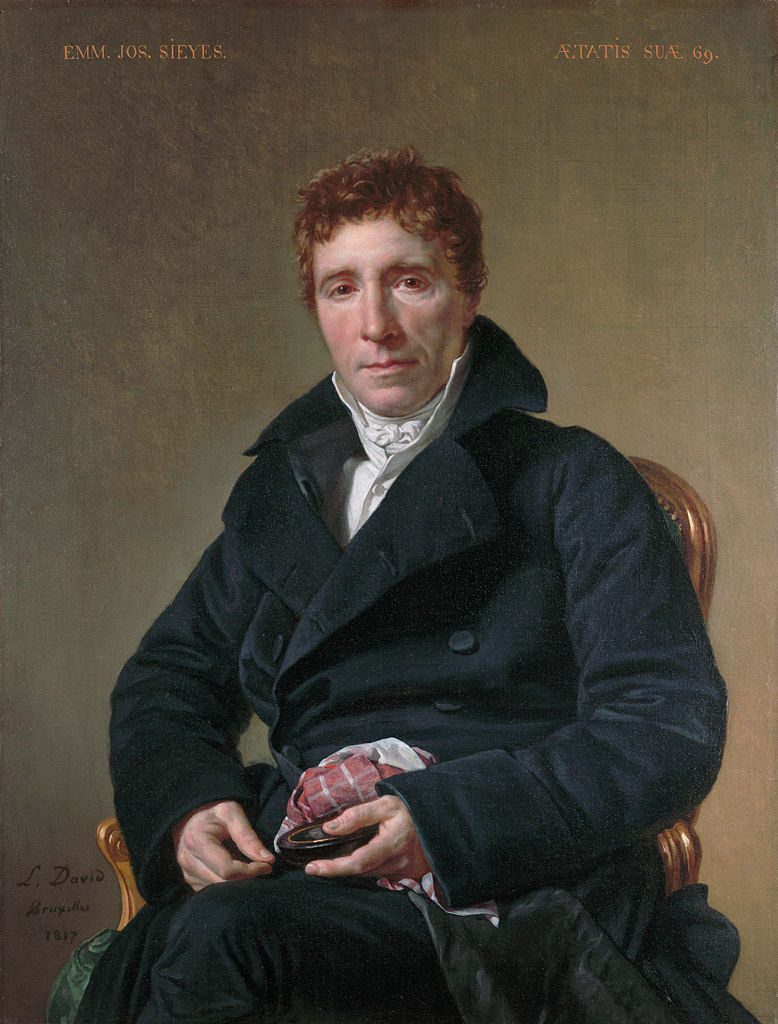Emmanuel Joseph Sieyès, also known as the Abbè Sieyès, was a major player of the French Revolution. During this period he challenged the ancien régime system of unequal representation in the Estates-General and fought against the traditional privileges held by the aristocracy and clergy. He believed that the members of the third estate were the true foundation of France and that they deserved to play a role in French politics equal to their importance. As a member of the clergy, and therefore of the first estate, he did not let his privileges influence him, and he worked hard to help the third estate rise to the level of its rightful stature.
In the eighteenth century, French society was divided into three traditional estates going back to the middle ages. Representatives from these three estates had traditionally met in something called an Estates-General, which met when the French king would call for it to meet. Once assembled, it would debate on topics and issues of importance to the realm, and give the king their opinion on a matter by voting by estate. However, last time the Estates-General had been called together was 1614. When they were called upon to meet again, in 1789, they did so in the wake of a major shift in understanding the nature of representation. Traditionally, the first estate was made up of members of the clergy, the second estate was made up of the nobility, and the third estate was made up of commoners, or everybody who was not of the clergy or nobility. They were all ruled by a king, who was considered a part of no estate. Traditionally, each estate had one vote when voting at the Estates-General; thus, the nobility and clergy each had one vote, and they often voted together, while the third estate, which was made up of more than 95 percent of the population of France, only had one vote as well. This was a serious problem because the representatives of 95% of France could be outvoted by the 5% minority of the nobility and clergy. Before they met in 1789, this had not been seen as a problem, because the concept of equal or proportional representation only arose in the wake of the French Enlightenment, becoming manifest in the American Revolution. Previously, the Estates-General only met during times of conflict and crisis. During these times, the peasants were the ones most affected, whether with taxes or extreme poverty, and they never had adequate representation to defend their situation.1 But in 1789, as the Estates-General was being called together, with this change in sentiment about representation circulating in intellectual circles, how would that sentiment become manifest as it had in the motto of the American Revolution–“no taxation without representation?” The man who made it manifest was Abbè Sieyès.
Emmanuel Joseph Sieyès was born on May 3, 1748, and one would not have thought that he was destined to lead an important, high profile life. He was the son of a postmaster and notary, and while he did not live extravagantly, he lived fairly comfortably. As a child, Sieyès had a private tutor, and then he went to college at the Jesuits’ College at Fréjus where his teachers adored him and thought that he was extremely smart. This was important for him, because some middle-class students were regularly recruited to be trained for the clergy, which could mean a social improvement to their current status. When he was seventeen, he joined the Seminary of Saint-Suplice in Paris and made a good reputation for himself. While he was there, he broadened his knowledge and started learning about things that would become his passion later on in life. He showed an interest in the writings of the French Enlightenment, which would influence his decisions and passions. As a clergyman, he was very popular and moved up its career ladder quite quickly. In 1773, by the time he was twenty-five, he was ordained a priest. Quickly after that he moved up to secretary to the Bishop of Treguier, thanks to connections who knew the Bishop of Fréjus. He stayed an administrative priest after this, but worked on other matters that were closer to his heart.2
During his career as a priest, he wrote several works. Two of his works were anonymous and the third is now considered theory by historians. Before he became well known, he wrote the “Letter to the Physiocrats On Their Political and Moral System.” This work looked at the political side of economic activity that was beneficial to the nation as a whole. With this kind of thinking in mind, Sieyès joined the provincial assembly of Orleans in 1787.3
In 1788, the King of France, Louis XVI, was facing serious financial problems, and he called the meeting of the Estates-General for May 1, 1789. As mentioned earlier, the group had not met since 1614, and so a lot of people were uncertain about the role that this group would have in current French politics. However, it became clear even before the Estates-General met that the first two estates would vote against any of the reforms that the third estate might suggest, especially if those reforms infringed upon their traditional rights and privileges; and this caused a lot of debate and frustration.4
It was during the time between when King Louis XVI called the meeting and when the meeting actually took place that Sieyès published his first pamphlet called, “Essai sur les privileges” or “Essay on privileges.” Sieyès argued that privilege went against natural law, reason, and community. Sieyès did not think that the nobility deserved to have special privileges because it did nothing to earn them. He showed how the nobility were like parasites, just taking advantage of French society and reaping the benefits from the work of others. He argued that the current division of society based on estate privileges was not conducive to a well-functioning society. Shockingly, he stated that the nobility had no place in their modern society that was progressing.5

In December of 1788, months before the meeting of the Estates-General, he wrote another pamphlet that questioned the constitution of the Estates-General itself. He argued for the importance of making a national assembly to better represent the majority of the population that created the wealth of the nation. Both of these pamphlets built up and led to his third and most famous pamphlet, “Qu’est-ce que le tiers état?” or “What is the third estate?” This was arguably the most influential pamphlet of its time. The pamphlet argued for a drastic change in political power in the French legislative system. It challenged the inequality of power in the Estates-General and questioned why the largest and most hardworking part of society had the least amount of power, and why they had only one vote compared to the combined votes of the clergy and nobility, who made up only three percent of the entire French population. Traditionally, each of the three estates were to debate among themselves on some important issue and then take a collective vote that would be their final estate vote. Sieyès suggested a method that would replace the vote by estate with a simple head count vote of all representatives of the three estates taken together. This pamphlet was radical for the time, because it questioned the right and legitimacy of the first two estates to represent the nation of France at all.6 Sieyès asked three simple questions that put the entire arrangement of the ancien régime under indictment:
What is the third estate?–Everything.
What, until now, has it been in the existing political order?–Nothing.
What does it want to be?–Something.7
By the time the Estates-General met in May, Sieyès was well-known and well-liked by the general population, even though he was a member of the first estate of the clergy. His theories were at first viewed very favorably by reformers and it earned him a seat at the Estates-General as a representative of the third estate, where people took him seriously and listened to what he had to say.8 King Louis XVI had wanted to tax the nobility, who had always been exempt from paying taxes. Traditionally, taxes were first raised on the peasants, but on this occasion, the peasants simply could not bear to pay more. The king had to call the Estates-General together because the two privileged estates did not want to surrender their tax exemptions. Much to their disappointment, the third estate, led by reformers such as Sieyès, looked to the example that America had provided against the British. Thanks to Sieyès and his pamphlet What is the third estate?, members of the third estate asserted their answer to Sieyès’ third question: What does [the third estate] want to be? Something. They broke away from the Estates-General and formed the National Assembly to be the representative body of France, to vote on matters that concerned the nation of France, and to establish a constitution that would bind all members of society into a social contract, including the king.9 In essence, they turned the absolutist kingdom of France and its subjects into the nation of France governed by a constitutional monarch and its citizens.
Emmanuel Sieyès strongly influenced his time by being bold enough to speak out against the abuse of the upper class on the lower class. Even though he could have just stayed silent and enjoy the privileges of his estate, instead he saw the injustices that so many of his fellow countrymen were facing, and he took his stand against it.
- Encyclopædia Britannica, 2014, s.v. “Estates-General.” ↵
- Salem Press Biographical Encyclopedia, 2016, “Emmanuel-Joseph Sieyès,” by Irwin Halfond. ↵
- Salem Press Biographical Encyclopedia, 2016, “Emmanuel-Joseph Sieyès,” by Irwin Halfond. ↵
- Encyclopædia Britannica, 2014, s.v. “Estates-General.” ↵
- Salem Press Biographical Encyclopedia, 2016, “Emmanuel-Joseph Sieyès,” by Irwin Halfond. ↵
- Emmanuel-Joseph Sieyès, What Is the Third Estate? ed. Nicholas Snead (Gale, Cengage Learning, 2013), 348. ↵
- Emmanuel Joseph Sieyès, Qu’est-Ce Que Le Tiers État. ↵
- Emmanuel-Joseph Sieyès, What Is the Third Estate? ed. Nicholas Snead (Gale, Cengage Learning, 2013), 350-351. ↵
- Jerry Bentley, Herbert Ziegler, and Heather Streets-Salter, Traditions & Encounters, 4th ed., vol. 2 (New York: McGraw Hill Education, 2015), 474. ↵



50 comments
Peter Alva
Abbe is what I would call an activist. He was able to help the lower estate Identify that their voices were being suppressed through the voting system and that they really had no say in what policies and wars they would get into. He enabled the french people to engage more with the government then they were allowed to.
Brandon Vasquez
The Third Estate was the backbone of France. Not only did it make up 97% of the French population but it also ran much of the country. Not only did the Estate’s General unfairly represent the Third Estate by only allowing one vote for the majority of the population but also ultimately led to the French Revolution and the fall of the monarchy.
Jared Sherer
This article was very well written and descriptive about Abbe Sieyes and his involvement in and influence upon the French Revolution. Learning about the different estates and Sieyes’ impact on the majority of the population was very enlightening. For example, Ms. Rider introduces the reader to Sieyes’ pamphlet, where he asks three very simple, but monumental questions. The author provided a clearly written and well researched article that educated the audience about Sieyes’ background and how he impacted the French Revolution and helped France become a “nation” rather than a “kingdom” as it had been, using his status as a “first-estate” clergyman to gain the trust of and help the “third-estate” commoners.
Anna Steck
This article clearly highlights the importance of the enlightenment and the way it encouraged political revolution. I appreciated learning more about Sieyès and his pamphlet that really does appear to have a similar affect of Thomas Paine’s “Common Sense.” It is interesting that his study as a priest are what lead him to these political views. This went against his personal upward mobility in favor of a greater equality for the whole.
Jacob Salinas
This was a very interesting article to read. Before reading this article, I had no idea who this was. Abbe Siyes was very important for the French Revolution. He fought for the members of the Third Estate and said that they deserved to be involved in more political decisions. I liked the way the article was structured. It made it very easy to follow.
Jacob Adams
I had no idea who this person was before I learned about him in my history class recently. I found it interesting that he was a renegade of sorts that helped the people who were being treated unfairly. Although, I feel like this is the bare minimum for someone of the clergy. I feel as though his contribution to the French cause however was minimal, if anything it caused it to crumble. I liked the pictures used throughout the article, they were relevant and kept me engaged in the reading
Azeneth Lozano
It was interesting to read that Abbé Sieyès being one of the most influential people for France. He was from the top estate of the Estates General classes and fought for the rights of the lower estate to show how unequal the system was. It is also fascinating that Sieyès wrote one pamphlet, “What is the Third Estate?” that was a turning point in the French government and economy. Overall, well written article with a great descriptive introduction.
Christopher Morales
This story made me route for the third estate. I still cannot believe the numbers that 5% of the population made the decisions for the 95% left. This was shown can cause serious issues especially with the rich wanting to stay and get even richer at the expense of the third estate. In order to pay debt, the third estate was being taxed. This is a situation where they had no say but had to follow because they had little representation. I sympathized with them due to your writing and telling the story that describes the effort of the third estate to be something.
Sydney Nieto
Interesting article. I was surprised to see how Abbè Sieyès would help lower classes, especially knowing how people of his status don’t normally do that. For example, how he didn’t think that the nobles should get special privileges, etc. With his courage he was able to make changes and gain the influence of the people. Overall, good read as it was easy to understand.
Gabriella Parra
The Estates General was an interesting system because it technically gave French people representation but power was unfairly distributed and the council did not meet often enough to be effective. It’s surprising to me that the second estate made up of the nobility was not required to pay taxes since they are the families who would have money to spend. With the amount that the third estate contributed to the economy, they definitely deserved more influence in French politics and Sieyes explained that well with his three questions.